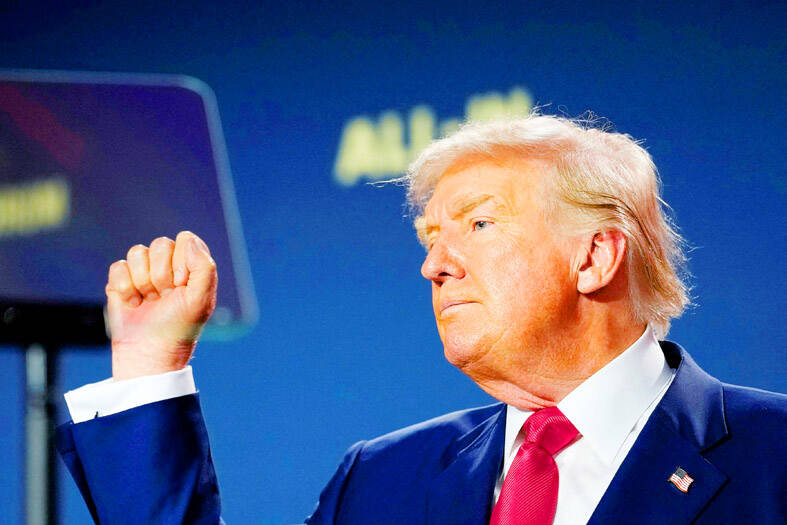The US would sell “so much” beef to Australia, US President Donald Trump said on Thursday after Canberra relaxed import restrictions, adding that other countries that refused US beef products were on notice.
Australia on Thursday said it would loosen biosecurity rules for US beef, something analysts predicted would not significantly increase US shipments because Australia is a major beef producer and exporter whose prices are much lower.
“We are going to sell so much to Australia because this is undeniable and irrefutable Proof that U.S. Beef is the Safest and Best in the entire World,” Trump wrote on social media.

Photo: Reuters
“The other Countries that refuse our magnificent Beef are ON NOTICE,” the post continued.
Trump has attempted to renegotiate trade deals with numerous countries he says have taken advantage of the US — a characterization many economists dispute.
“For decades, Australia imposed unjustified barriers on US beef,” US Trade Representative Jamieson Greer said in a statement, calling Australia’s decision a “major milestone in lowering trade barriers and securing market access for US farmers and ranchers.”
Australia is not a significant importer of beef, but the US is and a production slump is forcing it to step up purchases.
Last year, Australia shipped almost 400,000 tonnes of beef worth US$2.9 billion to the US, with just 269 tons of US product moving the other way.
Australian officials said the relaxation of restrictions was not part of any trade negotiations, but the result of a years-long assessment of US biosecurity practices.
Canberra has restricted US beef imports since 2003 due to concerns about bovine spongiform encephalopathy (BSE), or mad cow disease. Since 2019, it has allowed in meat from animals born, raised and slaughtered in the US, but few suppliers were able to prove that their cattle had not been in Canada and Mexico.
On Wednesday, the Australian Department of Agriculture, Fisheries and Forestry said US cattle traceability and control systems had improved enough that Australia could accept beef from cattle born in Canada or Mexico and slaughtered in the US.
The decision has caused some concern in Australia, where biosecurity is seen as essential to prevent diseases and pests from ravaging the farm sector.
“We need to know if [the government] is sacrificing our high biosecurity standards just so [Australian] Prime Minister Anthony Albanese can obtain a meeting with US President Donald Trump,” shadow agriculture minister David Littleproud said in a statement.
Australia, which imports more from the US than it exports, faces a 10 percent across-the-board US tariff, as well 50 percent tariffs on steel and aluminum. Trump has also threatened to impose a 200 percent tariff on pharmaceuticals.
Asked whether the change would help achieve a trade deal, Australian Minister for Trade and Tourism Don Farrell said: “I’m not too sure.”
“We haven’t done this in order to entice the Americans into a trade agreement,” he said. “We think that they should do that anyway.”

When Lika Megreladze was a child, life in her native western Georgian region of Guria revolved around tea. Her mother worked for decades as a scientist at the Soviet Union’s Institute of Tea and Subtropical Crops in the village of Anaseuli, Georgia, perfecting cultivation methods for a Georgian tea industry that supplied the bulk of the vast communist state’s brews. “When I was a child, this was only my mum’s workplace. Only later I realized that it was something big,” she said. Now, the institute lies abandoned. Yellowed papers are strewn around its decaying corridors, and a statue of Soviet founder Vladimir Lenin

ELECTRONICS BOOST: A predicted surge in exports would likely be driven by ICT products, exports of which have soared 84.7 percent from a year earlier, DBS said DBS Bank Ltd (星展銀行) yesterday raised its GDP growth forecast for Taiwan this year to 4 percent from 3 percent, citing robust demand for artificial intelligence (AI)-related exports and accelerated shipment activity, which are expected to offset potential headwinds from US tariffs. “Our GDP growth forecast for 2025 is revised up to 4 percent from 3 percent to reflect front-loaded exports and strong AI demand,” Singapore-based DBS senior economist Ma Tieying (馬鐵英) said in an online briefing. Taiwan’s second-quarter performance beat expectations, with GDP growth likely surpassing 5 percent, driven by a 34.1 percent year-on-year increase in exports, Ma said, citing government

UNIFYING OPPOSITION: Numerous companies have registered complaints over the potential levies, bringing together rival automakers in voicing their reservations US President Donald Trump is readying plans for industry-specific tariffs to kick in alongside his country-by-country duties in two weeks, ramping up his push to reshape the US’ standing in the global trading system by penalizing purchases from abroad. Administration officials could release details of Trump’s planned 50 percent duty on copper in the days before they are set to take effect on Friday next week, a person familiar with the matter said. That is the same date Trump’s “reciprocal” levies on products from more than 100 nations are slated to begin. Trump on Tuesday said that he is likely to impose tariffs

HELPING HAND: Approving the sale of H20s could give China the edge it needs to capture market share and become the global standard, a US representative said The US President Donald Trump administration’s decision allowing Nvidia Corp to resume shipments of its H20 artificial intelligence (AI) chips to China risks bolstering Beijing’s military capabilities and expanding its capacity to compete with the US, the head of the US House Select Committee on Strategic Competition Between the United States and the Chinese Communist Party said. “The H20, which is a cost-effective and powerful AI inference chip, far surpasses China’s indigenous capability and would therefore provide a substantial increase to China’s AI development,” committee chairman John Moolenaar, a Michigan Republican, said on Friday in a letter to US Secretary of